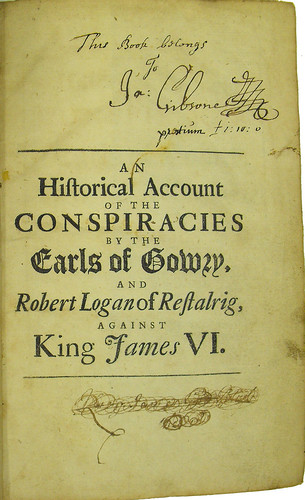Thomas De Quincey
George MacKenzie: An historical account of the conspiracies by the Earls of Gowry...
Edinburgh: James Watson, 1713
Sp Coll RB 1223A pencil note inside the back board attributes ownership of this volume to Thomas De Quincey (1785-1859), but there is no additional evidence to support this. Born in Manchester, the son of a prosperous linen merchant, De Quincey showed exceptional early promise but at the age of seventeen, he ran away from Manchester Grammar School and spent several months living rough on the streets in London, an experience which he recounted in his famous work Confessions of an English opium-Eater. He entered Oxford University in 1804, but left after four years without taking a degree. He moved to the English Lake Distict in order to be near his friends William Wordsworth and Samuel Taylor Coleridge, but they grew apart as he became dependent on opium. From 1819 he was a regular contributor to Blackwood's Edinburgh Magazine. During his time at the magazine he produced more than two hundred essays on a wide range of subjects. He also contributed essays to the London Magazine, and wrote articles on writers such as Wordsworth, Coleridge, Robert Southey and others which featured in Tait's Edinburgh Magazine from around 1834. In 1845 Blackwood's published his sequel to the Confessions, entitled Suspiria De Profundis.
George MacKenzie was Secretary of State for Queen Anne who supported the rising in Scotland on behalf of Charles II. He was created Earl of Cromarty in 1703. He also supported the Union between England and Scotland, writing some pamphlets in its favour. He was a man of considerable learning and amongst his numerous writings is this volume, which refers to the events of the "Gowrie conspiracy", which under mysterious circumstances led to the death of the Earl and his brother Alexander Ruthven at Perth House at the hands of King James I's attendants.

Image: Title page of George MacKenzie's An historical account...
Go to the next book in the exhibition, previously owned by: Sir Walter Scott.


